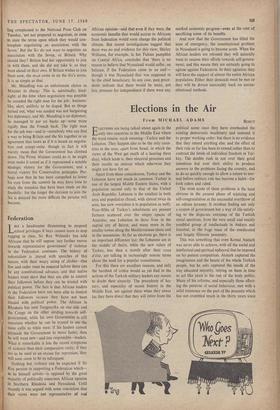Federation
LIKE a headmaster threatening to suspend school privileges if boys cannot learn to stop ragging in class, Sir Roy Welensky has told Africans that he will oppose 'any further moves towards representative government' if violence in the Federation continues. The history of colonialism is littered with speeches of this nature, with their weary string of clich6s—that law and order must be restored before there can be any constitutional advance, and that native leaders must show that they are able to control their followers before they can be trusted with political power. The fact is that African leaders in the Federation have not been able to Control their followers because they have not been trusted with political power. The African in Rhodesia has seen Tanganyika on one side and the Congo on the other striding towards self- government, while his own Government is still uncertain whether he can be trusted to use the same cafés as white men; if his leaders cannot 'Persuade the Government to move faster, then he will want new—and less responsible—leaders. What is remarkable is less the recent symptoms of violence than their comparative rarity; if they are to be used as an excuse for repression, they will soon cease to be so infrequent.
Nothing but violence can be expected if Sir Roy persists in supporting a Federation which— as he himself admits—is opposed by the great Majority of politically conscious African opinion in Northern Rhodesia and Nyasaland. Until recently it was argued with some conviction that their views were not representative of real African opinion—and that even if they were, the economic benefits that would accrue to Africans from federation would soon change the political climate. But recent investigations suggest that there was no real evidence for this view; Shirley Williams, for example, in her Fabian pamphlet on Central Africa, concludes that 'there is no reason to believe that Nyasaland would suffer, on balance, if the Federation came to an end'— though it was Nyasaland that was supposed to be the chief beneficiary. In any case, past prece- dents indicate that there would be more, not less, pressure for independence if there were any marked economic progress—even at the cost of sacrificing some of its benefits.
And now that the Government has lifted the state of emergency, the constitutional problem in Nyasaland is going to become acute. When the African leaders are released they will naturally want to resume their efforts towards self-govern- ment; and this means they are certainly going to agitate against Federation. In their agitation they will have the support of almost the entire African population. Either their demands must be met or they will be driven inexorably back on uncon• stitutional methods.










































 Previous page
Previous page